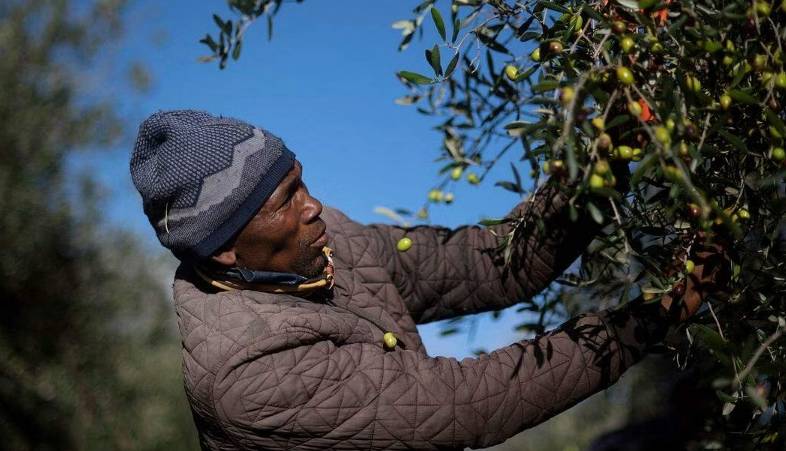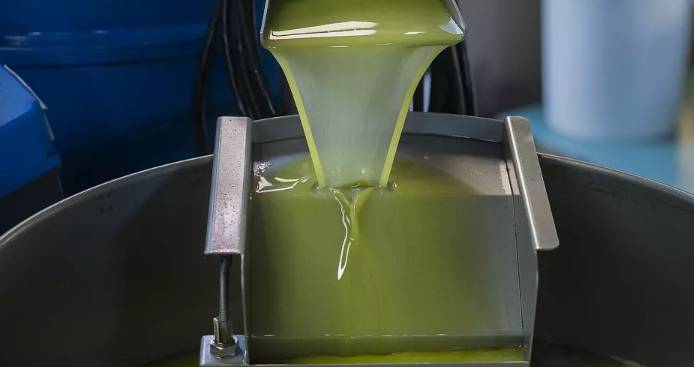
While South Africa is renowned for its wines, it has not traditionally been recognized as a major player in the world of olive oil. The dominance in the olive oil market has long been held by countries like Greece, Italy, and Spain.
Despite the challenges, South African farmers remain determined and optimistic as they set their sights on capturing a portion of the highly profitable market for premium extra virgin olive oils. At Tokara, a farm located just outside Cape Town, workers diligently use rakes to gently coax the ripe olives from the branches, allowing them to gracefully fall to the ground.
Amidst the picturesque scenery that resembles Tuscany, the bountiful olive harvest is in full swing in this renowned wine region at the southern tip of Africa. Gert van Dyk, the 49-year-old operations manager of the farm, proudly holds a glass of recently pressed extra virgin olive oil that received accolades in the United States earlier this year.
“Can you perceive the captivating aroma?” he asks, inviting others to savor the sensory delight.
As he swishes the pale green liquid across his palate like a seasoned sommelier, Gert van Dyk describes the experience, saying:
“You can appreciate the pleasant bitterness lingering at the back of your throat. Then the peppery notes emerge, leaving a delightful warmth.”
Initially focused on wine production, the estate has now embraced olive oil as one of its flagship offerings, even providing tastings for enthusiasts to explore its flavors.
“South Africa has truly exceptional olive oil of remarkable quality,” exclaims Christophe Dehosse, a French restaurateur aged 55.
Reflecting on his arrival in the country three decades ago, he reminisces about the limited use of olive oil among the local population at that time.
“However, nowadays, numerous farms have started cultivating olives… there is truly no justification for purchasing olive oil from Europe, which is 10,000 kilometers (6,200 miles) away,” expressed Dehosse, who is the proprietor of four restaurants in the area.
He further added:
“We have the privilege of obtaining exceptional, handcrafted products that are truly magnificent.”
At his dining establishment, Dehosse presents a trendy Italian-inspired starter featuring a humble bread accompanied by olive oil, a combination that has gained significant popularity. He consistently opts for locally-sourced oil, stating:
“I am confident that the oil I purchase is pure and unadulterated. It is guaranteed to be 100 percent extra virgin olive oil.”
According to SA Olive, an association of growers and producers, the origins of olive cultivation in South Africa can be traced back to the early 20th century when an Italian immigrant named Fernando Costa began growing olives. However, it was in 1998 that Giulio Bertrand, a retired Italian residing in South Africa, took a significant step by importing 17 different varieties of olive trees and planting them on his farm in Stellenbosch.
Presently, the Morgenster farm boasts 42 hectares of olive tree cultivation, while countless trees throughout the country can trace their ancestry back to Bertrand’s initial plantings. Vittoria Castagnetta, Bertrand’s 29-year-old granddaughter and an employee of the family business, describes her grandfather as the trailblazer who earned the moniker “father of olive oil in South Africa.” His contributions have laid the foundation for the thriving olive oil industry we see today.

Since those early days, the picturesque hills of the Cape region have become renowned for their ideal Mediterranean climate and stunning vineyards, yielding olives of exceptional quality that have gained international recognition. In a testament to their excellence, a South African olive oil was bestowed with the prestigious title of “Absolute Best Olive Oil” in the world at the esteemed EVOOLEUM awards held in Spain in May. This accolade solidifies South Africa’s position as a formidable player in the global olive oil market.
Situated 400 kilometers from Stellenbosch, the victorious De Rustica farm benefits from the same Mediterranean climate that contributes to its exceptional olive oil. Although olive oil has traditionally been seen as a luxury product in South Africa, producers like Van Dyk have observed a notable surge in demand from the local market in recent years, driven by a growing emphasis on healthier dietary choices. As more South Africans prioritize wellness, the allure of high-quality olive oil as a wholesome and flavorful ingredient has captured their attention.
With an annual production of up to two million liters of olive oil, South Africa still has a journey ahead to rival the volumes of major global brands that exceed three million tons. However, the country’s progress in establishing itself in the luxury olive oil industry is a source of pride. Similar to the recognition garnered by South African wines, the potential of the country’s olive oil awaits discovery and wider acclaim. As the chef remarks, South Africa’s olive oil industry has the capability to shine on the international stage with time and exploration.
With the challenges of droughts and recurring heatwaves affecting traditional olive oil producers in Europe, South Africa has an opportunity to position itself for the export market. The impact of climatic disasters has led to low output, resulting in a significant increase in global olive oil prices in recent months. This presents a favorable environment for South Africa to establish its presence and potentially meet the rising demand for olive oil worldwide.
According to Baillon Intercor, an international oil broking firm, the price of olive oil has experienced a significant increase in recent months. In January 2022, it was being sold at 3,500 euros ($3,700) per tonne. One year later, the price rose to 5,300 euros ($5,680), and this month it skyrocketed to 5,800 euros ($6,216). This surge in prices highlights the growing demand and challenges faced by olive oil producers worldwide.
